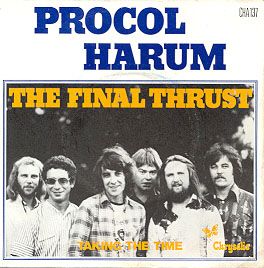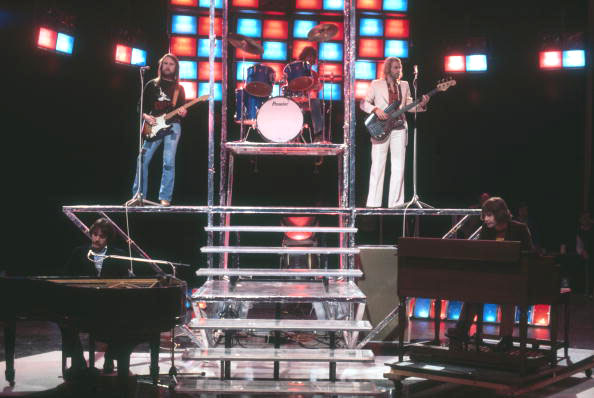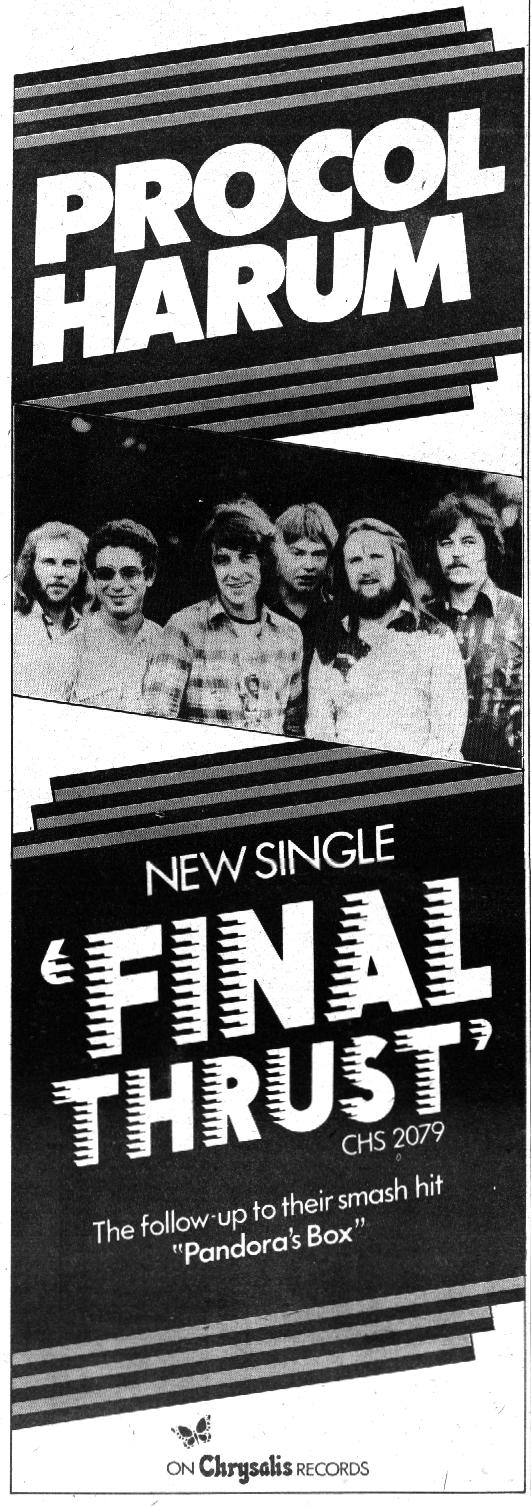'Taking Notes and Stealing Quotes'
The Final Thrust

Despite being selected as follow-up to a big hit single (this led to a UK TV appearance on Supersonic for a most unusually-presented Procol Harum, piano and organ at ground level, the fretmen stacked up above them on scaffolding, and BJ's drums head high above that
... see below) this is one most neglected items in the canon. In vinyl terms it presents an anti-climax to the end of side one of the album, and its pretty melody and 'facetious tango tempo' (as the Press kit put it) pall on repeated listening. Its topic appears to be martial – yet in his droll song introductions about the band's 'trilogy' of war songs [there are arguably a lot more than three] Gary Brooker avoids references to this one; he even ventured a rare criticism of his own writing when he told Henry Scott-Irvine that The Final Thrust should not have got on to a record.
 The song is taken at a moderate pace, in A major, and presents an uneasy marriage between shades of an English hymn tune and a military marching stomp vaguely angled towards white reggae. The sparse introduction sounds like a trite early 60s pop single, and the hook gets frequent repetition: in this respect the song is ancestor to an even more simple stab at the charts, Wizard Man. The rich C sharp major chord (after 'place or show') is the furthest that the song gets from its home key: chiefly it progresses predictably through the cycle of fourths, avoiding glibness by the way vocal melody hits accented notes outside the chords and then lets them resolve – in an echo of the popular Sunday-school tune to Oh Jesus I have promised. Given the all-'male' line ends in Reid's libretto, however, this technique involves some awkward distending of monosyllables over the two notes, not least when the vowel (such as the 'u' in 'thrust') does not carry very well, or is followed by a sibilant consonant-cluster.
The song is taken at a moderate pace, in A major, and presents an uneasy marriage between shades of an English hymn tune and a military marching stomp vaguely angled towards white reggae. The sparse introduction sounds like a trite early 60s pop single, and the hook gets frequent repetition: in this respect the song is ancestor to an even more simple stab at the charts, Wizard Man. The rich C sharp major chord (after 'place or show') is the furthest that the song gets from its home key: chiefly it progresses predictably through the cycle of fourths, avoiding glibness by the way vocal melody hits accented notes outside the chords and then lets them resolve – in an echo of the popular Sunday-school tune to Oh Jesus I have promised. Given the all-'male' line ends in Reid's libretto, however, this technique involves some awkward distending of monosyllables over the two notes, not least when the vowel (such as the 'u' in 'thrust') does not carry very well, or is followed by a sibilant consonant-cluster.
Chris Copping's organ-playing makes several important textural contributions, a cold shiny mist in the high register and a warmer tone in the tenor; during the middle instrumental it acquires a creamy crematorium tremolando. Alan Cartwright's bass is very active, contributing some of its most prominent runs on record, clearly an integral part of the composition; the Grabham guitar work is confined to squalling off-beats on one channel, and his expected solo never comes, being taken instead by a sprightly piano, even though that has already been featured heavily, and double-tracked, in the introductory material to each verse. BJ spends most of his time on the snare drum playing either off beats or contributing a military-sounding snare from his Boys' Brigade heritage; but there is another effect, a knocking sound on the right channel, tracking the bass line, whose origin is difficult to judge: it could even be a tuned percussion sound emanating from a synthesiser.
A lot of work evidently went into the realization of this slight piece, and the hands of the new-boy producers are much in evidence. It does, however, contain some classic Procol motifs, not least in chord-inversions of the chorus; the scalar keyboard writing (cf She Wandered Through the Garden Fence, Grand Finale .. and later Backgammon) is in keeping with fans' expectations, though the same cannot be said of the vestigial guitar and the anaemic rhythm track. Keith Reid disclosed that the song had posed problems of interpretation: 'I really liked the song, before the group had played it. When we started rehearsing it, it just didn’t work out at all. We just couldn’t see a way of doing it, at all. In fact when we played it to Leiber and Stoller, they couldn’t see how to do it … It just seemed to come together in the studio. I really liked the way it turned out.'
The record company must have liked it too, since The Final Thrust/Taking The Time (CHS 2079) was released as a single in October 1975 in the UK, the A side being an edited version (3:15 instead of 4:32). It was advertised as "The follow-up to their smash hit Pandora’s Box,' but – competing with numerous strong contenders including a re-released Homburg on Cube – it was a miss. It was played live only a couple of times, at gigs shortly after the release of Ninth. It was last heard at the Kongressaal, Munich on 19 January 1976, a concert whose setlist contains numerous rarities; it may be that unfavourable reviews of the single (' …sounds like classic 'B' side material, ie half-hearted ... ' NME) caused it to be dropped from the set, or maybe it just isn't very enjoyable to play?
- 'It's the final throw': the allusion seems to be to throwing dice and taking chances, with overtones of throwing your efforts into a push to win a war. The word 'throw' occurs four times in this song, always more or less obscurely; elsewhere its significance is clearer: 'try to throw some light' (Salad Days (Are Here Again)); 'Throw away my bottle' (Whisky Train); 'Throw the key' (Simple Sister); 'bruised and thrown' (Power Failure); 'cut you up and throw you in' (The Piper's Tune); 'throw me a line' (Into the Flood).
- 'The final blow': this is reminiscent of 'body blow' in Into the Flood: both 'throw' and 'blow' carry overtones of hand-to-hand combat; the word 'bust ' that follows is an idiomatic word for 'break' (or sometimes 'burst') which of course has another meaning, 'bosom', which some listeners will immediately think of when the copulatory 'make our thrust' follows; yet, if any sexual overtone was intended (as 'blow' might seem to imply), it is not much built on later in the song.
- 'Break or bust': the term in economic writings is 'boom or bust'. It has been suggested that short-lined songs (there are several on The Prodigal Stranger) developed towards the end of Procol's career in order to assist Brooker with remembering his words; but so many of the short lines are so similar, it seems just as likely that they would have made the task of memory harder. Surely, with Boredom, this is one of Reid's very sparest lyrics.

- 'We can't give in' / 'We must go on': the tone is one of compulsion, rather than of self-belief.
- 'Right or wrong': Reid returns to this antithesis in The Truth Won't Fade Away: here attention is drawn to the fact that moral certainty is a common casualty of war, and that killing has to be done whether it is right or wrong. Similar qualms surface in 'faith or doubt we must cast them out'.
- 'There's no time for doubt': a hymnal quality in the words here is not matched in the new, scalar motif that arises in the accompanying music. It has been noted that this corresponds quite closely to the background vocal in the Beatles' Dr Robert, which we shall consider further in the notes on Robert's Box. 'Doubt' is a word Reid does not use much: 'no doubt about it, it's my own tombstone' (Something Following Me); 'a doubting Thomas who would be?' and 'only sometimes, still no doubt' (Glimpses of Nirvana); 'The rest will come without a doubt' (Without A Doubt).
- 'We must fight it out': the word 'fight' occurs frequently in Procol Harum's songs,. so many of which are narratives of struggle: 'In fighting I did hurt those dearest to me' (Pilgrims Progress); 'French girls always like to fight' (Grand Hotel); 'Fights the flab in every house' (TV Ceasar); 'The cause for the fighting has long been a ghost' (Fires (Which Burnt Brightly)); 'Fighting for freedom' (As Strong as Samson); 'fighting monsters all my life' (Fool's Gold); 'One hell of a fight' (This Old Dog); 'Not a lover or a fighter' and 'talking of the fight' (the unpublished I'm a Reader and a Writer).
- 'Lose or win' … 'Gain or blow': an expectation that the lines will contain neat opposites is set up, then undermined. Nonetheless the narrative, if such it be, is strongly built around opposites, and most of the pairs are commonplace. 'Faith or doubt' is a most unusual antithesis to find in a pop song, however, specially one whose jaunty execution doesn't suggest any existential depths.
- 'Place or show': these are terms from the exhibiting prize animals: 'win', 'place' and 'show' are the three levels of award in order of desirability.
- 'We can't let go, we won't let go': a grim determination in the words is emphasised by the half-hearted community effort in the vocals, oddly reminiscent of enforced class singing in English schools … perhaps echoing the maxim that battles were 'won on the playing fields of Eton'.
- 'We must cast them out': 'cast' is archaic and appears in ordinary parlance only as a jocular excess; it remains the characteristic verb, however, for use in cases of exorcism. We do refer to 'casting cares to the wind' however: Cast Your Fate to the Wind was an instrumental smash hit for Sounds Orchestral in 1964. The 'cast' here presumably relates to the multiple 'throwings' in the song, and the dicing to determine or resolve fate.
- 'It's the final thrust': the title phrase is saved up for the very end of the lyric ... one guesses that it alludes to the 'push' for victory or the pushing in of a bayonet. Some listeners may be convinced by a sexual interpretation of thrusting, or even persuade themselves that there is a pun on 'vinyl thrust ', in view of Chrysalis's campaign to keep the band afloat in the charts at this point in their career. If so, the poor reception that the single was accorded constitutes a sad irony. The Procol's Ninth press kit referred to this song as ' lyrically warlike … enough ambiguity here to describe a last ditch effort of any kind. But one that's a lost cause' and Gary Brooker has said 'It’s not a war song, it’s about that sort of trouble.' Martial interpretations are promoted by the self-evidently warlike theme of the preceding track, but The Final Thrust never mentions military conflict directly, and it has been suggested that the whole song refers to boxing. There was a strong C20th tradition in London of well-loved Jewish boxers – probably driven into pugilism by poverty, caused by discrimination – which could conceivably have filtered into the author's consciousness (in the unpublished I'm a Reader and a Writer he uses 'on my toes' and 'trading blows'). The curious percussion and lurching syncopations in the Final Thrust arrangement could arguably be related to the rhythmic thuds of pugilism: 'we must fight it out' adds to this impression. If we follow this reading, 'lose or win we can't give in' will refer to the biggest disgrace, surrender: boxers go on to the end even if losing is certain. 'Can't let go' refers to a title the fighter is defending, and 'place or show' begins to make sense in the context of three-round tournaments such as those at the Wonderland Whitechapel, in which the boxers get an overall place as a result of their individual bouts. The problematic 'gain or blow' now makes sense, since points are awarded by judges for skill and strategy ('gain') as well as punches that actually connect ('blow'). 'Final blow / throw' relates to the knockout punch that ends the fight. There were as many as thirty of these Jewish boxers in London as early as the late 1700s (Daniel Mendoza, 'Dutch' Sam Elias, Barney Aarons, Abby and Issy Belasco) and around World War Two another wave arose including Gershon Mendeloff [aka Ted 'Kid' Lewis], Al Phillips, Judah Bergman [aka Jack 'Kid' Berg], Harry Mizler, Benny Caplan, Lew Lazar, Moe Moss, Kid Bones [Alfred Burnett], Bert Cannons [Reuben Segal]; Johnny Brown [b Philip Eckman] died only in 1975. The worlds of boxing and World War overlap interestingly in the fact that the first Jewish British soldier killed in World War I was an army boxing champion.
Thanks to Frans Steensma for additional information about this song
 The song is taken at a moderate pace, in A major, and presents an uneasy marriage between shades of an English hymn tune and a military marching stomp vaguely angled towards white reggae. The sparse introduction sounds like a trite early 60s pop single, and the hook gets frequent repetition: in this respect the song is ancestor to an even more simple stab at the charts, Wizard Man. The rich C sharp major chord (after 'place or show') is the furthest that the song gets from its home key: chiefly it progresses predictably through the cycle of fourths, avoiding glibness by the way vocal melody hits accented notes outside the chords and then lets them resolve – in an echo of the popular Sunday-school tune to Oh Jesus I have promised. Given the all-'male' line ends in Reid's libretto, however, this technique involves some awkward distending of monosyllables over the two notes, not least when the vowel (such as the 'u' in 'thrust') does not carry very well, or is followed by a sibilant consonant-cluster.
The song is taken at a moderate pace, in A major, and presents an uneasy marriage between shades of an English hymn tune and a military marching stomp vaguely angled towards white reggae. The sparse introduction sounds like a trite early 60s pop single, and the hook gets frequent repetition: in this respect the song is ancestor to an even more simple stab at the charts, Wizard Man. The rich C sharp major chord (after 'place or show') is the furthest that the song gets from its home key: chiefly it progresses predictably through the cycle of fourths, avoiding glibness by the way vocal melody hits accented notes outside the chords and then lets them resolve – in an echo of the popular Sunday-school tune to Oh Jesus I have promised. Given the all-'male' line ends in Reid's libretto, however, this technique involves some awkward distending of monosyllables over the two notes, not least when the vowel (such as the 'u' in 'thrust') does not carry very well, or is followed by a sibilant consonant-cluster.
